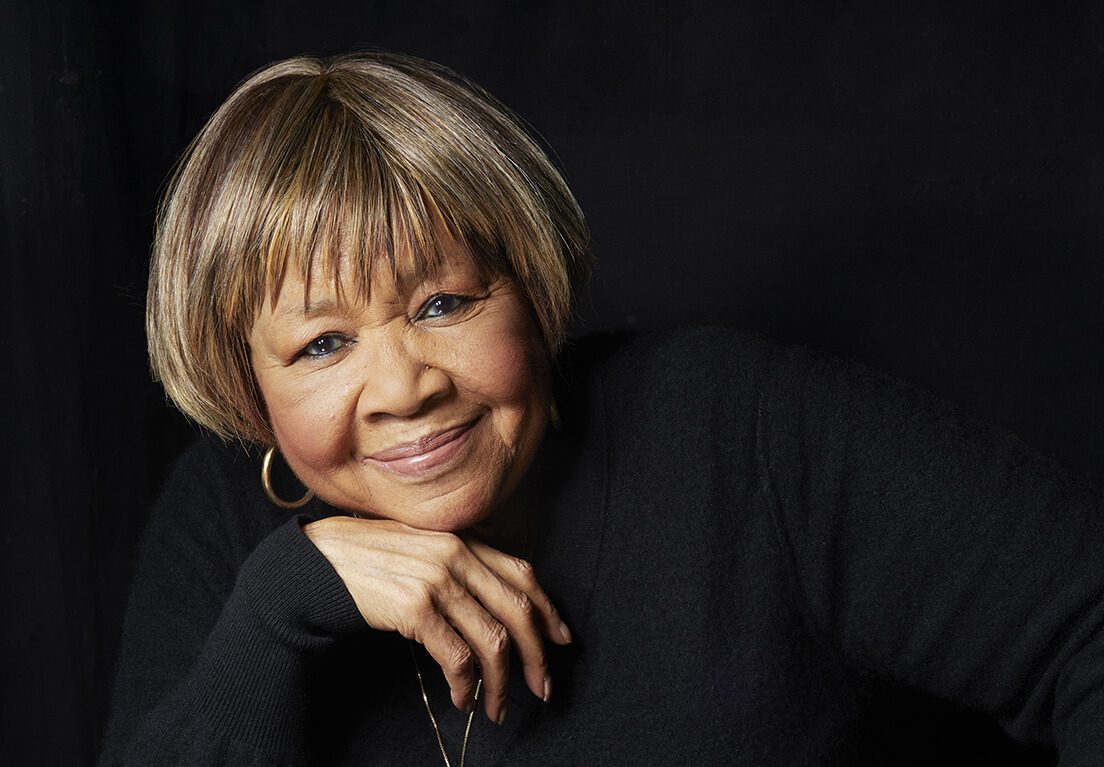Il est impossible de confondre la voix grave et granuleuse de Mavis Staples, véritable trésor national. Qu’il s’agisse d’un enregistrement des années 1950 avec les Staple Singers ou d’un titre solo capté plus d’un demi-siècle plus tard, la voix de Mavis est instantanément reconnaissable, capable d’élever l’âme et d’inspirer tous ceux qui l’entendent.
Mavis a grandi musicalement au sein du groupe familial, les Staple Singers, dirigé par son père, Roebuck « Pops » Staples. Ensemble, ils ont su marier gospel et musique profane comme nul autre, devenant à la fois des vedettes populaires et des figures respectées du mouvement des droits civiques. De 1955 à 1975, ils ont signé huit succès dans le Top 40 américain, dont les incontournables I’ll Take You There et Let’s Do It Again, tous interprétés par Mavis, ce qui leur a valu le surnom de « plus grands faiseurs de tubes de Dieu ». (La compilation The Ultimate Staple Singers: A Family Affair 1955-1984, parue en 2004, offre un excellent aperçu de leur carrière.)
En parallèle, Mavis a enregistré des albums solo de manière sporadique entre la fin des années 1960 et les années 1990. Mais c’est dans les années 2000 qu’elle a réellement pris son envol en solo, avec une série d’albums marquants, dont You Are Not Alone, qui a atteint le sommet du palmarès gospel de Billboard et remporté le Grammy Award du meilleur album Americana en 2010.
La chanteuse a poursuivi sa lancée durant toute la décennie 2010 : elle a été l’objet du documentaire hommage Mavis!, a remporté un Grammy dans la catégorie American Roots pour See That My Grave Is Kept Clean, et a fêté son 79e anniversaire sur scène devant un public captivé à Londres, captation publiée en 2019 sous le titre Live in London.
Un concert joyeux de 2011 en compagnie de Levon Helm et de son groupe a été publié à titre posthume en 2022 sous le titre Carry Me Home. Le respect et l’admiration que suscite Mavis Staples dépassent largement les frontières des genres musicaux, comme en témoignent ses intronisations au Rock & Roll Hall of Fame, au Blues Hall of Fame, et au Gospel Music Hall of Fame.
There is no mistaking the deep grainy contralto of national treasure Mavis Staples. Whether it’s a 1950s side with the Staple Singers, or a solo cut recorded over half-a-century later, Mavis’ voice is instantly identifiable, likely to lift the spirit and inspire anyone within earshot.
Mavis came up with her familial group, the Staple Singers. Led by her father, Roebuck “Pops” Staples, they balanced gospel and secular music like no one before or after them, and in the process became both stars and respected Civil Rights activists. With eight Top 40 pop singles through 1975, including the chart-topping “I’ll Take You There” and “Let’s Do It Again” — all of which were fronted by Mavis — they earned the title of “God’s greatest hitmakers.” (The 2004 collection The Ultimate Staple Singers: A Family Affair 1955-1984 is a fine sampler of their recording career.)
Outside the group, Mavis sporadically recorded solo albums from the tail-end of the ’60s through the ’90s. In the 2000s, she took full flight on her own with a spirited series of LPs highlighted by You Are Not Alone, which crowned Billboard’s gospel chart and won the 2010 Grammy award for Best Americana Album.
The singer’s roll continued throughout the 2010s, as she was the subject of the celebratory documentary Mavis!, won a Grammy in the American Roots field for “See That My Grave Is Kept Clean,” and spent her 79th birthday in front of a rapt overseas audience as heard on the 2019 set Live in London. A joyous 2011 performance in which she was joined by Levon Helm and his band received a belated release on 2022’s Carry Me Home. Further proof of Mavis’ high regard and broad appeal is in her inductions into the Rock & Roll, Blues, and Gospel Music halls of fame.
CE SPECTACLE EST GRATUIT!
Ce contenu provient d’AllMusic et est adapté par PAN M 360
























